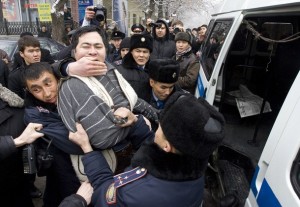
EurAsia Review | Sunday, February 07, 2010
By Joanna Lillis
Kazakhstan’s government is mulling a plan that would enable China to lease a large swath of Kazakhstani land for agricultural use. The proposed deal is stirring passionate opposition in the Central Asian state, with critics expressing concern about the country’s sovereignty.
Controversy has been brewing since December, when President Nursultan Nazarbayev announced that China had expressed a desire to lease a million hectares of Kazakhstani land. Under the proposal, Chinese growers would cultivate soybeans and rapeseed, which is used to produce vegetable oil, on the leased land. The government insists that opponents of the lease-scheme are overreacting.
Despite government assurances, the possibility that China could possess Kazakhstani territory leaves many citizens skittish, and their fears were on full display at a January 30 rally against the plan. The officially sanctioned gathering drew roughly 1,500 people, an unusually large crowd in a country where public protest is tightly controlled and rallies sometimes elicit an apathetic public response. Participants portrayed the deal as a threat to national security. Some waved a turquoise Kazakh national flag with a yellow Chinese dragon imposed on it. Others carried placards with the slogan: "The fate of the land is the fate of the nation!"
Rally organizers included leaders of opposition parties and activists from nationalist movements and left-wing organizations. They took the stage below a giant statue of Vladimir Lenin, the leader of the Bolshevik coup of 1917, whose outstretched hand dominated the proceedings.
A prominent theme was the perception of foreign domination of Kazakhstan. "What has been left for the Kazakhs? Is there oil? No! Is there copper? No! Natural resources have been given away!" Azat OSDP party co-leader Bolat Abilov said in a fiery address. "What has been left to us from our ancestors? Only the land is left! Authorities want to give that out to foreigners too!"
One leader of the unregistered Alga! Party, Vladimir Kozlov, drew approving cheers by addressing the crowd in Kazakh: "I am [an ethnic] Russian -- I am a Kazakh citizen!" he cried. "Kazakh land is my land!"
Economic grievances appeared to blend with nationalist sentiment to fuel emotion. Appeals were published in the independent press during the run-up to the rally that urged people to vent their frustrations "if you are against the transfer of Kazakhstani land to foreign states in any form; if you are against land being the cause of social stratification and strife?; if you are against poverty, injustice, and abuse; if you are for [our] own land becoming the basis for the real independence and prosperity of the people of Kazakhstan."
Ahead of the rally, the prosecutor’s office issued a statement warning people against stirring up ethnic enmity, or resorting to illegal actions.
Some protestors at the January 30 rally lent a lighter note to the proceedings with tongue-in-cheek publicity stunts. One group of activists set up a stall serving the traditional Kazakh meat and pasta dish known as beshbarmak, with the usual horsemeat or lamb replaced with Peking duck and eaten with chopsticks, instead of with the hands, as is traditional in Kazakh culture. Another enthusiastic young protestor tore off the head of a toy panda to symbolize his opposition to Chinese encroachment.
Even before the late January rally, the strong public reaction to the plan had officials backtracking. "No one is going give land away to the Chinese," Prime Minister Karim Masimov said on December 14. "People are especially speculating on such feelings." Both he and Nazarbayev pointed out that the constitution bans foreigners from owning land in Kazakhstan.
Deputy Agriculture Minister Arman Yevniyev clarified the same day that what the government has in mind is the joint production of soybeans, rapeseed and corn in Kazakhstan with Chinese growers. "Negotiation procedures are now starting, and in the near future representatives of the Chinese side should come for talks," the Novosti-Kazakhstan news agency quoted him as saying.
Land remains a highly emotive issue in Kazakhstan. The traditional pastoral, nomadic ways of the Kazakhs were devastated by Stalin’s collectivization policies in the late1920s and 30s. At least a million people (by some estimates double that number) died in a famine caused by the state’s effort to drive nomadic herdsmen into collective farms.
The disruption caused by collectivization is still being felt today. In his late January state-of-the-nation address, Nazarbayev lamented the low productivity of the agrarian sector and set the objective of producing 80 percent of foodstuffs domestically by 2014 to replace the flood of imports on the market.
Against this background, it is no surprise that emotions are running high over the question of allowing Chinese growers access to Kazakh land. "We could lose our sovereignty," Abilov said in an interview with EurasiaNet after the rally. "We are categorically against handing over land. We can work it effectively ourselves."
Critics of Chinese influence also point to Beijing’s heavy involvement in Kazakhstan’s oil and gas sector. In 2009, Beijing extended a $10-billion dollar credit line to Astana, at the same time acquiring the MangystauMunayGaz energy concern, which controls proven reserves of 500 million barrels of oil. The deal boosted China’s already significant influence in the sector through interests controlled by the China National Petroleum Corporation (CNPC).
London-based banker Mukhtar Ablyazov -- who is wanted in Kazakhstan on fraud charges that he denies, and which he insists are politically motivated -- alleged last month that energy deals with China had been tainted by massive corruption. His naming of Nazarbayev’s son-in-law Timur Kulibayev in this connection sparked Kulibayev to file a libel suit against Ablyazov and three media outlets that reported the allegations -- Respublika and the associated Golos Respubliki, Vzglyad, and Kursiv -- in Kazakh courts on January 28.
Joanna Lillis is a freelance writer who specializes in Central Asia.












